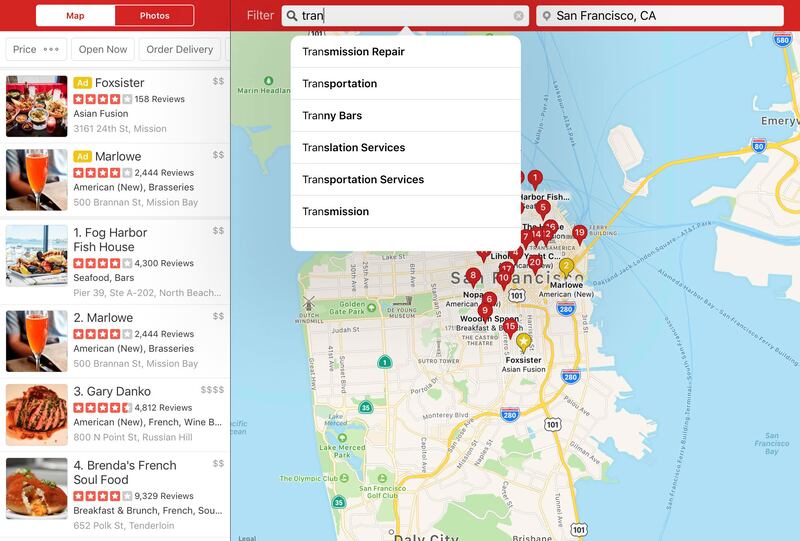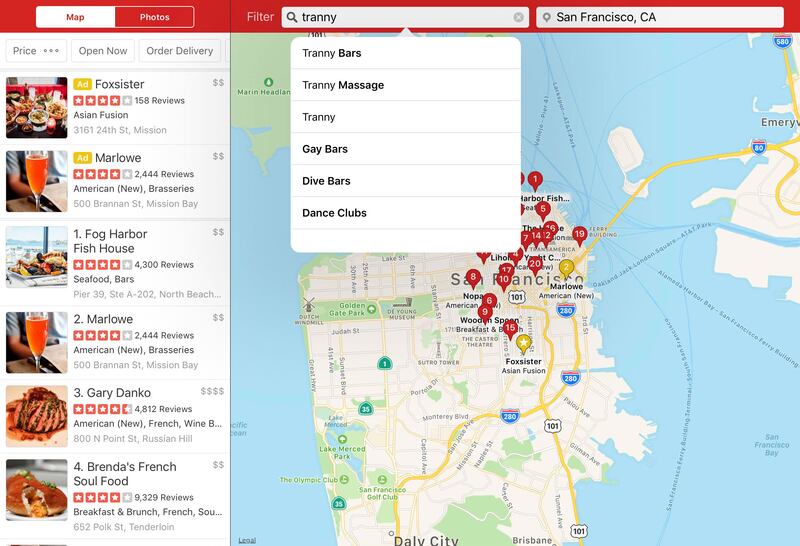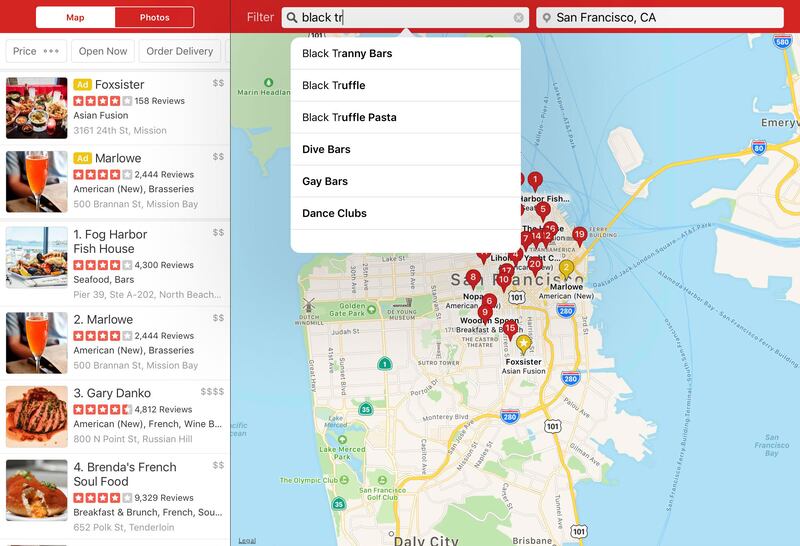Restaurant reviewing app Yelp allows users to filter for gender-neutral restrooms. The company also scored a perfect 100 on the Human Rights Campaign’s Corporate Equality Index, which measures the LGBT-friendliness of workplaces.
But until earlier today, the Yelp search box across multiple devices would make suggestions that included the anti-transgender slur “tranny.”
The search behavior was first highlighted on Twitter Monday night by the transgender personals website Transgenderdate.com.
On devices tested by The Daily Beast Tuesday morning, beginning to type “tran-” in the Yelp search box brought up the suggestion “Tranny Bars” right after “Transmission Repair” and “Transportation.”

Typing out the full term “tranny” revealed another suggestion: “Tranny Massage.”

And a user typing “black tr-”—perhaps in search of some black truffle pasta—might have come across the suggestion “Black Tranny Bars” instead.

The Daily Beast asked Yelp for comment on Tuesday morning, and by mid-afternoon, the search behavior in the application had already started to change. Terms like “Shemale Bars” and “Shemale Clubs” were still suggestions as of late Tuesday afternoon, but the derogatory “Tranny” suggestions were gone and Yelp pledged to address the issue.
“Thank you for bringing this to our attention and allowing us to correct it,” a Yelp spokesperson said in a statement to The Daily Beast. “This is a machine-generated error and we are taking prompt action to remove it from our systems.”
As for how the error came about, the spokesperson explained: “Included in the huge volume of search queries Yelp receives are some very rare, atypical ones that computer-generated models still try to match. They try to do this using historical user search data and patterns, which is made more difficult by the rarity of this search occurrence.”
The spokesperson further stressed that “no human programmed these results or matches and we are always working to monitor for machine-generated errors.”
The search behavior is one of the latest examples of the ways in which social media’s reliance on algorithms and computer modeling can negatively impact LGBT users.
In March 2017, LGBT YouTubers discovered that Restricted Mode—an optional, off-by-default content filtering feature—was hiding several non-explicit LGBT-themed videos from younger users, creating a massive uproar.
YouTube quickly said on Twitter that some videos had been “incorrectly labeled” and announced the following month that engineers had “fixed an issue” with Restricted Mode that was hiding the LGBT content.
In November 2017, as The Daily Beast previously reported, bisexual advocates pointed out that Twitter was blocking photo and video searches for the hashtag #bisexual with a message saying that “your Search settings could be protecting you from potentially sensitive content.”
Twitter quickly acknowledged the “error” and then later explained that certain words that were not “inherently explicit” had “incorrectly” been included on a list of explicit search terms. Twitter apologized, and searches for the #bisexual hashtag began including photos and videos shortly thereafter.
With Yelp, the issue was not the filtering out of LGBT content, but the suggestion of insulting anti-transgender search terms on par with anti-gay slurs like “faggot.”
Although terms like “tranny” and “shemale” remain common in the categorization of online pornography, they are generally considered derogatory and insulting, apart from their limited in-group use among those transgender people who wish to reclaim them.
The media reference guide of the LGBT advocacy group GLAAD notes that such terms “dehumanize transgender people and should not be used in mainstream media.”
For transgender people who use Yelp to find transgender-friendly nightlife spots, suggested searches like “Transgender Bars” or “Transgender Clubs”—both of which still populate below the search bar—are certainly helpful.
But seeing a term like “Tranny” pop up while attempting to search for a transgender-friendly business could be a jarring experience. Fortunately, those suggestions are already disappearing hours after The Daily Beast brought it to Yelp’s attention.
The fact that they were previously showing up below the search bar offers yet more evidence that the kind of computer-generated behavior which social media companies rely on to handle large numbers of users can backfire for a marginalized few.
Yelp was one of several tech companies to sign on to a pro-LGBT amicus curiae brief in the Masterpiece Cakeshop case. And like Yelp, both Twitter and YouTube’s parent company Google scored a perfect 100 on the Corporate Equality Index. But for social media companies, being LGBT-friendly is not just a matter of corporate policy, but of monitoring what goes on under the hood of their often-automated technology.






